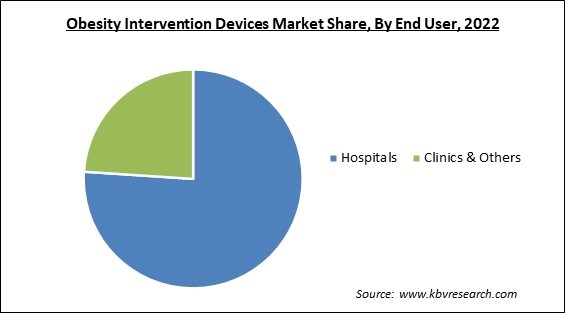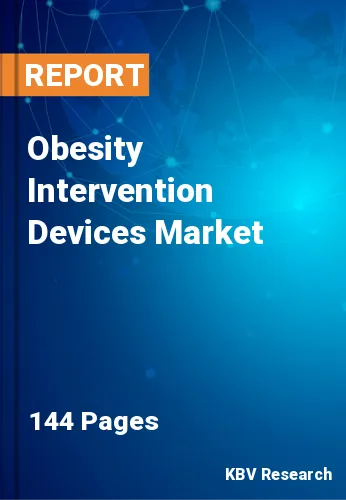The Global Obesity Intervention Devices Market size is expected to reach $352 Million by 2029, rising at a market growth of 5.3% CAGR during the forecast period.
Hospitals are increasingly adopting advanced and innovative devices and have expert professionals for performing procedures and managing patients' weight loss journeys. Thus, Hospitals are expected to generate approximately 3/4th share of the market revenue by 2029. According to WHO, 38.2 million children under the age of five were overweight or obese in 2019. Overweight and obesity, once thought to be an issue only in high-income nations, are increasingly becoming more prevalent in low- and middle-income nations, especially in metropolitan areas. Since 2000, there has been a nearly 24% increase in the proportion of overweight children under 5 overweight children in Africa. In 2019, Asia was home to over half of the world's young overweight or obese children. Some of the factors impacting the market are Growing rate of obesity worldwide, Growing investment in healthcare sector and High cost of production and limited funds.

Overweight or obesity are terms used in the business sector to describe the state of having unhealthy body fat that may be harmful to one's health. Overweight is defined as having a body mass index (BMI) of 25 or higher, and obesity as having a BMI of 30 or higher. As a result, there is a growing market due to increased obesity and overweight people. Growing numbers and sizes of investments by governments of various nations in the healthcare sector are one of the primary drivers of the market’s growth. However, the high cost of research & development of obesity intervention devices and the absence of financial help may limit the market growth for obesity surgery devices.
Due to the global pandemic, numerous hospitals have had to close their doors or restrict their services to only emergency care. As a result, elective procedures such as gastric banding and implantation of gastric balloons have had to be delayed or abandoned. In addition, the fear of getting infected has also discouraged patients from seeking medical attention for such issues, further decreasing the need for obesity intervention services. However, the market witnessed an upsurge in demand again after the uplifting of restrictions imposed to curb the effects of COVID-19.
Based on device, the market is segmented into gastric bands, gastric balloon, and gastric stimulation system. In 2022, the gastric balloon segment covered a considerable held the highest revenue share in the market. One to three silicon balloons are inserted into the patient's stomach during a gastric balloon treatment, also known as an endoscopic intragastric balloon, over a few months to help the patient lose about 30% of their extra weight and therefore improve their health.
By end user, the market is bifurcated into hospitals and clinics. In 2022, the hospital segment witnessed the largest revenue share in the market. The number of people seeking medical attention for obesity is increasing, resulting in a rise in revenue for this market segment. In order to provide comprehensive obesity treatment, hospitals also have the necessary assets and infrastructure, including specialized medical equipment and highly trained medical professionals. This element is anticipated to support the market’s expansion in this segment.

| Report Attribute | Details |
|---|---|
| Market size value in 2022 | USD 247.2 Million |
| Market size forecast in 2029 | USD 352 Million |
| Base Year | 2022 |
| Historical Period | 2019 to 2021 |
| Forecast Period | 2023 to 2029 |
| Revenue Growth Rate | CAGR of 5.3% from 2023 to 2029 |
| Number of Pages | 144 |
| Number of Table | 250 |
| Report coverage | Market Trends, Revenue Estimation and Forecast, Segmentation Analysis, Regional and Country Breakdown, Companies Strategic Developments, Company Profiling |
| Segments covered | Device, End User, Region |
| Country scope | US, Canada, Mexico, Germany, UK, France, Russia, Spain, Italy, China, Japan, India, South Korea, Singapore, Malaysia, Brazil, Argentina, UAE, Saudi Arabia, South Africa, Nigeria |
| Growth Drivers |
|
| Restraints |
|
Region wise, the market is analyzed across North America, Europe, Asia Pacific, and LAMEA. In 2022, the North America region dominated the market with the maximum revenue share. This is because a large population suffers from chronic diseases, a growing demand for minimally invasive surgery procedures, and the healthcare industry is becoming increasingly important. As a result, there is a sharp rise in the demand for gastric bands in this region, supporting the market expansion.
Free Valuable Insights: Global Obesity Intervention Devices Market size to reach USD 352 Million by 2029
The market research report covers the analysis of key stakeholders of the market. Key companies profiled in the report include Johnson & Johnson, Apollo Endosurgery, Inc. (Boston Scientific Corporation), ReShape Lifesciences, Inc., AbbVie, Inc., Allurion Technologies, Inc., Spatz FGIA, Inc, Cousin Surgery, A.M.I. GmbH, ENDALIS, and GI Dynamics, Inc.
By End User
By Device
By Geography
The Market size is projected to reach USD 352 Million by 2029.
Growing rate of obesity worldwide are driving the Market in coming years, however, High cost of production and limited funds restraints the growth of the Market.
Johnson & Johnson, Apollo Endosurgery, Inc. (Boston Scientific Corporation), ReShape Lifesciences, Inc., AbbVie, Inc., Allurion Technologies, Inc., Spatz FGIA, Inc, Cousin Surgery, A.M.I. GmbH, ENDALIS, and GI Dynamics, Inc.
The expected CAGR of this Market is 5.3% from 2023 to 2029.
The Gastric Bands segment is leading the Market by Device in 2022 thereby, achieving a market value of $169.2 million by 2029.
The North America market dominated the Market by Region in 2022, and would continue to be a dominant market till 2029; thereby, achieving a market value of $124.4 million by 2029.
Our team of dedicated experts can provide you with attractive expansion opportunities for your business.

